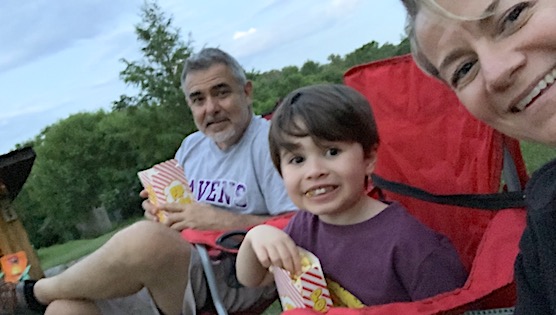Thanks for your support! If you make a purchase using our links in this article, we may make a commission. And, as an Amazon Associate, I earn from qualifying purchases. See the full disclosure here.
Here is our list of 21 Practical Tips for Living in an RV with Kids. We think all of these tips apply whether you’re in an RV with kids for a week, a year, or indefinitely.
Traveling in an RV is a great way to show your kids the world and make memories. Many parents worry that being on the road and sharing a smaller space with kids will be stressful, but with some planning, you can minimize the drama and focus on the fun!
1. Involve Your Kids in the Planning of the Trip
Whether you are traveling for a weekend or a year, check in with your kids about where they would like to go and what they would like to see and do on the trip. Does your child love swimming? Try to find campgrounds with pools or water access. Do you have an aspiring history buff in the family? Look for historic sites in the areas you plan to visit. Making sure there is something for everyone will keep the kids excited about the adventure.
2. Give Children Their Own Designated Space to Relax and Play
Whether it is a bunk bed or a special seat in the camper, it is important that everyone have their own space for quiet time or individual play. Having a designated space for play will also keep toys from spreading throughout the camper.
3. Limit the Amount of Toys You Bring
Perhaps the biggest challenge of traveling with children is determining which toys will come on the trip and which ones need to stay at home. Remember that kids can be overwhelmed when too many toys are available. Bringing a few age appropriate toys that are geared toward open-ended play (such as blocks or LEGOs) is a smart move while weighing your rig down with every toy your kids own is not.
4. Focus on the Reason That Your Family is Traveling
Is it to spend time together? See the great outdoors? You don’t need many toys for those goals! Children are also really good at finding objects to play within the natural environment. It is amazing what kids can create with just rocks and sticks.
5. Designate a Bin or Area for Children’s Toy Storage
Setting aside a bin or shelf in a closet for each child to fill with toys, books, and personal items will help limit the toys that come on the trip while giving kids ownership over what they bring. Think about how much space you have in the RV for each child and be clear about the space limitations.
6. Allow Your Child to Select His or Her Own Toys
Even if the toys they select seem strange to you your child will quickly learn which toys are fun to play with on camping trips and which ones are not. They will probably be surprised at how little they actually play with their toys on the road!
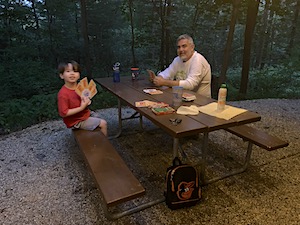
7. Bring a Mix of Both Indoor and Outdoor Activities and Games
Bag toss, soccer balls, a baseball and glove, and bikes are all great things to bring for outdoor play. Make sure you also have a few games and activities for bad weather. A few favorite board games can make the difference between a cozy rainy day in the camper and a boring day trapped inside.
8. Bring a Well-Stocked First Aid Kit
Depending on where you are going, you may be some distance from medical care. A first aid kit will allow you to treat minor injuries, bug bites, and illnesses with ease. If possible, consider taking a basic first aid course before hitting the road. Going over the basics will put your mind at ease and could even save a life. We keep the Swiss Safe First Aid kit on board and highly recommend you click this link to buy it. It’s small but packed full of all the supplies you will need.
9. Be Thoughtful About the Clothing That You Bring
No matter what size RV you have, it seems like space is always limited. Clothes take up a lot of space! Be thoughtful about how many clothes you bring for each child. The right amount of clothing depends on several factors- the weather, how long you will be traveling, and if you will have access to laundry facilities. Always bring a rain jacket and don’t forget your swimsuits if you will be near the water.
10. Consider a Handheld Two-Way Radio!
Two-way radios are a great way to keep in touch in the campground, especially when cell service may be limited. Parents and kids can stay connected when doing different activities in the park, such as hitting the showers or going on a trail. Two-way radios are also a great way to give older kids some freedom while giving parents peace of mind. Susan used to use walkie-talkies with her daughters when she took them camping. And they loved it! Follow this link to buy a great set of walkie talkies that your kids will love using around the campground!
11. Consider Using a Small Tent for Children’s Outdoor Play
If you feel like your kids are constantly underfoot in the camper, take it outside! A small tent for “kids only” is a great place for kids to play with blocks or LEGOs while keeping those items out of your sight and out from under your feet. This can also serve as a child’s space for resting and relaxation during the day or early evening. Older kids may enjoy camping outside in their own tent while parents enjoy peace and quiet in the RV. If you don’t have a tent, the awning on your rig can also serve as a nice place for reading or play.
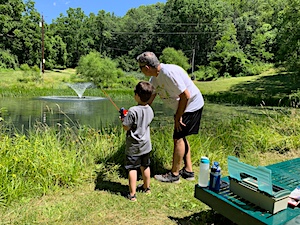
12. Choose “Kid-Friendly” Campgrounds
Whether you are seeking peace and quiet or lots of activities, be thoughtful about the campgrounds that you select for your family. If you are looking for activities that are more nature focused, such as hiking and biking, state or national parks may be the best place to start your search. If you want activities that are kid-focused such as pools, splash pads, mini-golf, and playgrounds, a private campground with amenities may be more your speed. Keep in mind that some campgrounds are more kid friendly than others. Be sure to read reviews and check out the websites of private campgrounds in advance to see if they are geared more towards families with children or older adults.
13. Select the Right Campsite
If the campground allows you to book a specific site in advance, check out the campground map and think about which location will work best for your family. If a map is not available or you are not sure which site would be best for you, call the campground and ask for their recommendation. Selecting a site close to a trailhead, pool, activity center or playground can make things easier on parents, especially when traveling with younger children. Camping near or adjacent to the playground allows parents to kick back and relax while the kids have fun. It is also a great way for your children to meet other kids at the park.
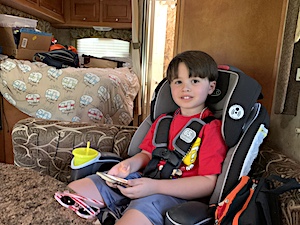
14. Bring Activities and Snacks for the Drive
Small, portable games such as highway bingo or magnetic checkers can ease the boredom of a long drive. If you allow your children to use electronic devices while traveling, make sure they are charged and ready for the journey. Healthy snacks for the drive will keep everyone in good spirits so the fun can begin as soon as you arrive. Apples, raisins, nuts, carrot sticks, and granola bars are all car friendly and easy to prepare. Make sure everyone has their own water bottle to prevent squabbling and keep everyone hydrated.
15. Plan to Make Frequent Stops When Traveling
If you are driving more than four hours, plan a stop along the way. Most kids (and parents) need a break after four hours on the road. A rest stop or park is a great place to stretch your legs, grab some lunch and use the restroom before arriving at your destination. State and national parks typically have RV or camper parking and are great places to take a break along your journey.
16. Maintain Your Same Routine and Schedule as Much as Possible
We all know that part of the fun of RVing is to get away from the daily routine, but remember that kids (and adults) thrive on structure. Let your kids know what you will be doing each day so they are prepared. Keeping meals and bedtimes at their regular times can prevent meltdowns. Take time to relax at your campsite. From hiking to kayaking to exploring a new destination, there are always things to do in any area that you visit. It can be easy to go, go, go, and run out of energy on a trip. To prevent needing a vacation after your vacation, remember to plan some downtime each day.
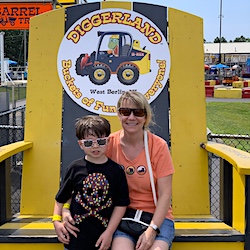
17. Try to Plan No More Than One or Two Activities Per Day
Set aside time each day for your kids to just hang out at the campsite. Taking time to read and relax in the afternoon or having an evening campfire are great ways to rest and recharge. Get a schedule of activities happening at the campground. Whether you are staying at an RV resort or a state or national park, there are often free or low cost activities at campgrounds. Ask at check-in or check out the message boards in the campground. Ranger hikes, bingo games, ice cream socials, and scavenger hunts are all fun for kids and they are often FREE!
18. Explore the Area
A day trip is a great way to break up a longer stay at a campground and check out something new. Nature preserves, state and national parks, and even city or county parks are all fun for kids to explore. If there is a city nearby, check out the local museums and attractions that are of interest to your family. Look for activities that will interest all ages, not just the kids! Depending on where you are traveling, many of these could be low cost or even free. If your family has a membership at a local museum, aquarium, or zoo, check out your membership benefits package to find attractions around the nation that maybe be free or discounted with your pass.
19. Meet Other Families
Even if the goal of your trip is to maximize family time, set aside some time for your kids to play with others in their age group. This is especially important on longer trips. Striking up a new friendship is a great way for kids to work on their social skills. Campgrounds are great places to meet other families. Your child may even make a pen pal or friend for life! Meeting other families can be as easy as walking through your campground. You can also connect with families ahead of time online. Follow the campground you plan to visit on social media. Join an RV travel group to find other families that will be in the area during your visit.
20. Make it Educational
Learning doesn’t have to stop just because school is out! There are many ways to add learning opportunities to your trip. If you will be visiting a state or national park and your child is school-aged, be sure to pick up a Junior Ranger activity booklet for your child to complete. These programs are designed for ages 5 to 99 and some parks offer programs for preschool aged children as well. Junior Rangers learn about the park, how to protect it, and earn badges for their work. You can also have kids learn about the history or culture of the state or area you are visiting, outdoor and/or water safety, and the plants and animals in the region. Older kids can help calculate trip mileage or create a budget for the trip.
21. Give Your Kids Responsibilities
Setting up and breaking down your campsite can be a lot of work! Kids enjoy being a part of “grown up” tasks. Depending on their ages, you can assign kids jobs such as putting away the dishes after meals, helping connect the water hose, or setting up the chairs at the campsite.
22. Short Travel Days
Let’s face it, one of the nicest things about RVing full-time is you don’t usually have to be anywhere. While if you have a traveling job position that may dictate where you need to be and when, for the most part, you will be in control of your schedule. When traveling from one destination to another, make travel days as short as possible.
Travel days can be hard on everyone, especially if some are getting restless. You can get tired and the kids will get bored. For the little kiddos under the age of 6 years old, typically three to four hour road trips seem to be the max.
By keeping your travel days shorter it can also mean reaching your ultimate destinations gets tough. This is where boondocking comes in. If you don’t know about boondocking, we have an article about it here on the website.
Consider getting apps and memberships like Campendium, Harvest Hosts, and Boondockers Welcome.
23. Routines Make Life Easier
Children need structure everywhere whether they are in school, in a sticks and bricks home, or when you are full time RVing. This is most important with younger kids as daily routines make them feel secure, teaches self-discipline, and establishes healthy habits.
The wonderful nomadic lifestyle of full time RVing is full of adventure, unknowns and new things, which is all great but it is also hard on little ones. Therefore, creating at least some routines into your daily life will help them feel grounded, safe, and secure.
24. Exclusive One On One Time
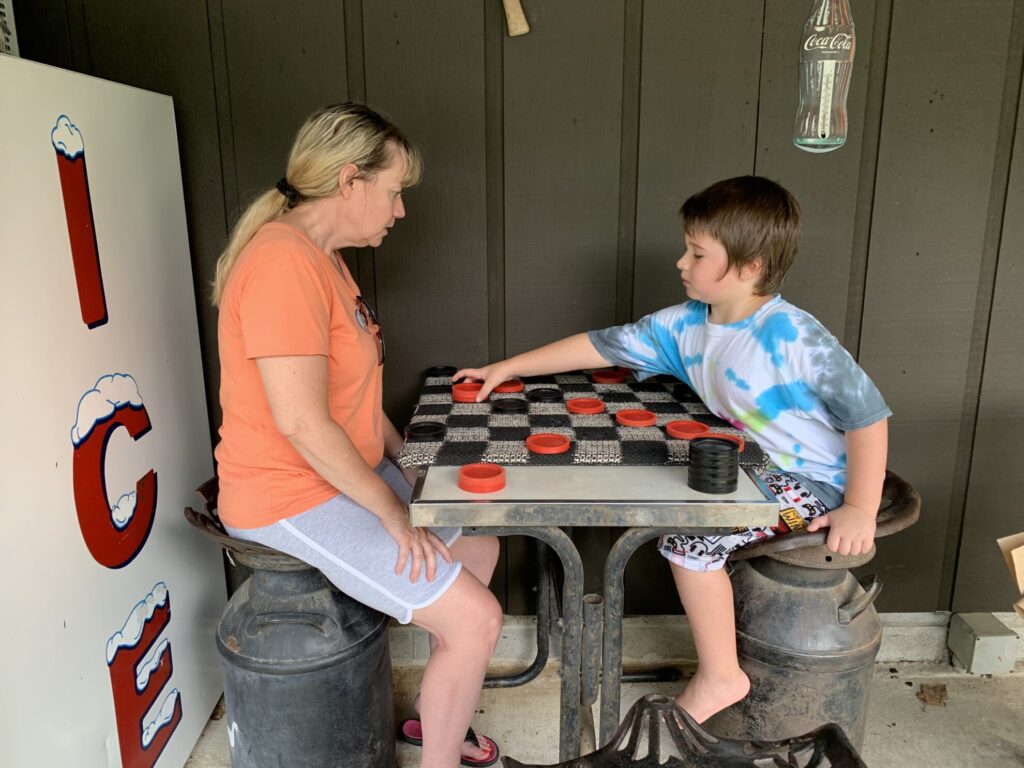
Children need your undivided attention from time to time. Living on the road means small spaces, homeschooling, and 24/7 family time.
If you have more than one child, making exclusive one on one time with each child gives them the opportunity to feel special, to express their feelings or concerns, and lets them get to know you better and vice versa. It’s a win-win for everyone!
25. Sense of Community On The Road
Everyone needs to feel like they belong to some part of the community or “tribe” so to speak. When you are totally nomadic living the RV lifestyle full time, this can be one of your greatest challenges. Find and join up with other full time RVing families from time to time so everyone, including yourself, does not feel isolated. When you see and talk to others doing the same lifestyle as yourself, you and your children will be happier.
Have fun! Remember that sharing your love of travel and the outdoors with your children is a great gift to give them. Take a deep breath, relax, and make some memories. Hopefully, you can use some of the 21 Practical Tips for Living in an RV with Kids to make your journey even more enjoyable.
Conclusion
Have fun! Remember that sharing your love of travel and the outdoors with your children is a great gift to give them. Take a deep breath, relax, and make some memories. Hopefully, you can use some of the 21 Practical Tips for Living in an RV with Kids to make your journey even more enjoyable.
Do you have any great tips to share about Living in an RV with Kids? Please leave your comments below!

